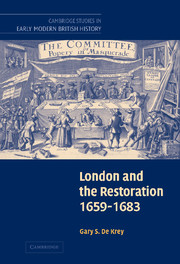Book contents
- Frontmatter
- Contents
- List of figures
- Map
- List of tables
- Preface
- List of abbreviations
- Part I Crisis, 1659–1660
- Part II Settlement and unsettlement, 1660–1679
- Part III Crisis, 1679–1682
- Introduction: London and the Restoration crisis, 1679–1682
- 4 Parliament and Protestantism in crisis: the emergence of parties in London, 1679–1681
- 5 The contest for the city, 1681–1682
- 6 Party matters: communities, ideas, and leaders in a divided city, 1679–1682
- Part IV Crisis and conspiracy, 1682–1683
- Conclusion: London and the end of the Restoration
- Appendices
- Appendix I 1670 London dissenting subscription
- Appendix II London dissenting common councilmen, 1669–1671
- Appendix III Whig party leaders
- Appendix IV Tory party leaders
- Bibliography
- Index
- Titles in the series
4 - Parliament and Protestantism in crisis: the emergence of parties in London, 1679–1681
Published online by Cambridge University Press: 07 May 2010
- Frontmatter
- Contents
- List of figures
- Map
- List of tables
- Preface
- List of abbreviations
- Part I Crisis, 1659–1660
- Part II Settlement and unsettlement, 1660–1679
- Part III Crisis, 1679–1682
- Introduction: London and the Restoration crisis, 1679–1682
- 4 Parliament and Protestantism in crisis: the emergence of parties in London, 1679–1681
- 5 The contest for the city, 1681–1682
- 6 Party matters: communities, ideas, and leaders in a divided city, 1679–1682
- Part IV Crisis and conspiracy, 1682–1683
- Conclusion: London and the end of the Restoration
- Appendices
- Appendix I 1670 London dissenting subscription
- Appendix II London dissenting common councilmen, 1669–1671
- Appendix III Whig party leaders
- Appendix IV Tory party leaders
- Bibliography
- Index
- Titles in the series
Summary
PARTY AND THE SUCCESSION, 1679–1680
The polarization of opinion, September–October 1679
The nearly two-year period between the prorogation of the 1679 parliament and the dissolution of the Oxford Parliament, in March 1681, saw two general elections, two sessions, and a renewal of Charles II's determination to maintain both his independence from parliament and a strict hereditary succession. It also saw a progressive polarization of public opinion, as the issues of the succession and of the church were debated in the press, in the streets, at the polls, and in parliament. In London, this period also included two controversial shrieval elections, one of which drove both the civic opposition and civic loyalists toward new forms of political organization. Historians have understandably focused their attention in these months upon the parliamentary confrontations between Charles and his adversaries. But the two sessions actually occupied less than twelve weeks in the autumn and winter of 1680–81 and another week in March 1681. The politics of the period were shaped less by the meeting of parliaments than by waiting for parliaments.
The dissolution of the 1679 parliament in July prompted little outward complaint from the civic opposition, probably because Charles also issued writs for the election of a new body, the meeting of which was announced for October 1679. But no session would actually occur between May 1679 and October 1680, as Charles repeatedly put off meeting with his newly elected parliament.
- Type
- Chapter
- Information
- London and the Restoration, 1659–1683 , pp. 174 - 220Publisher: Cambridge University PressPrint publication year: 2005



